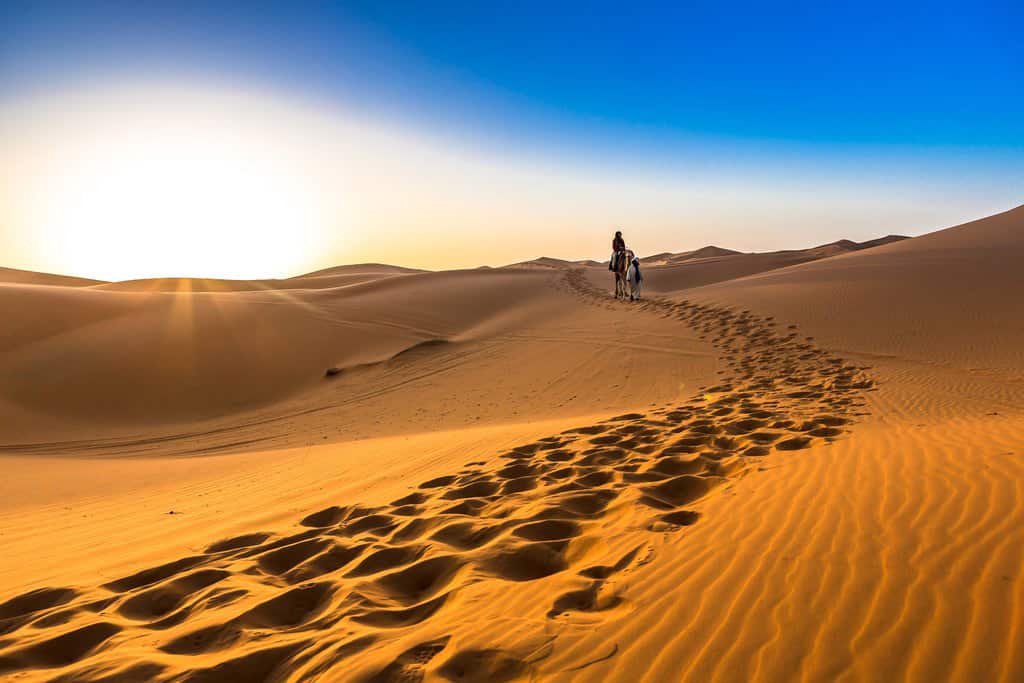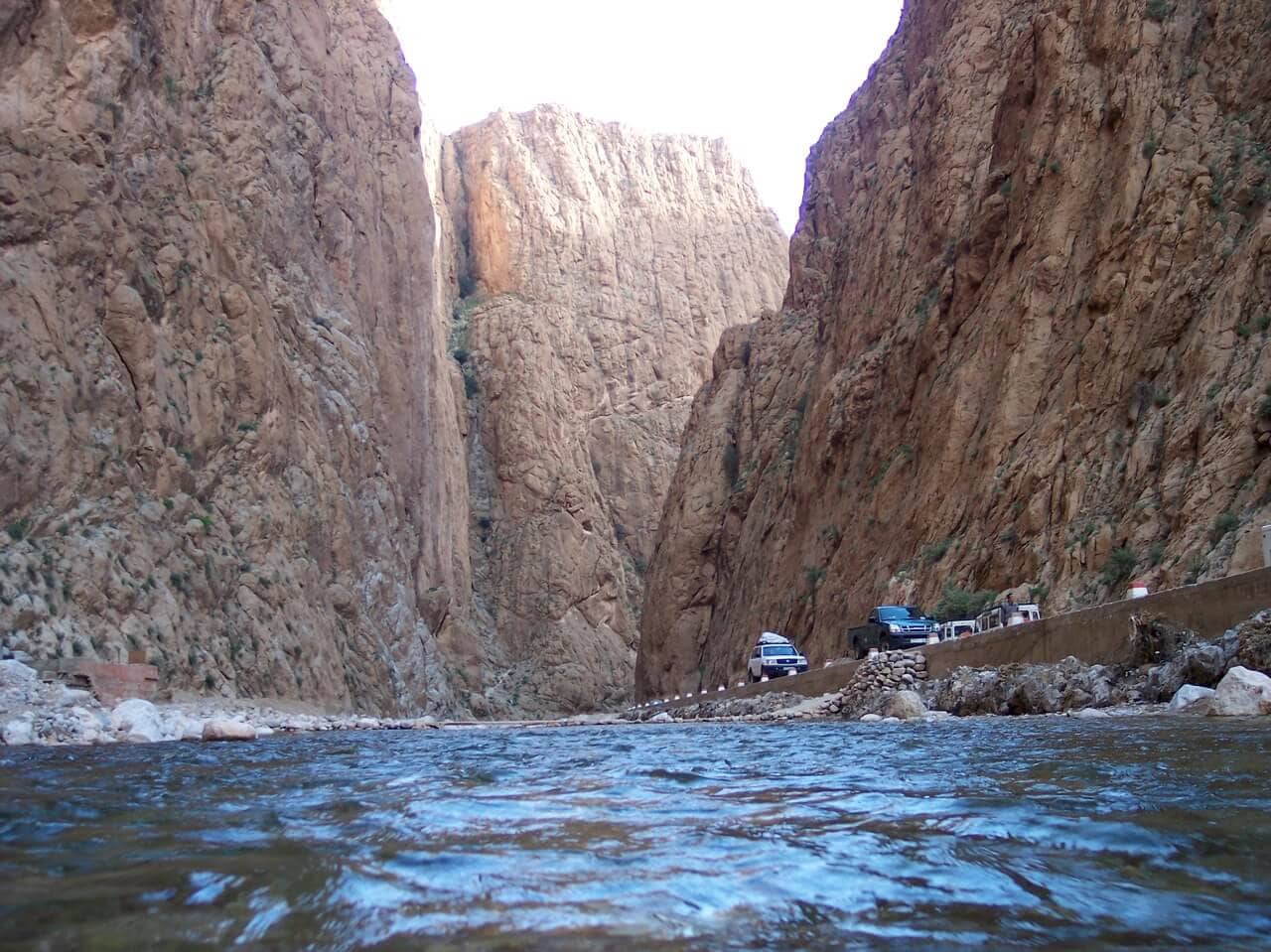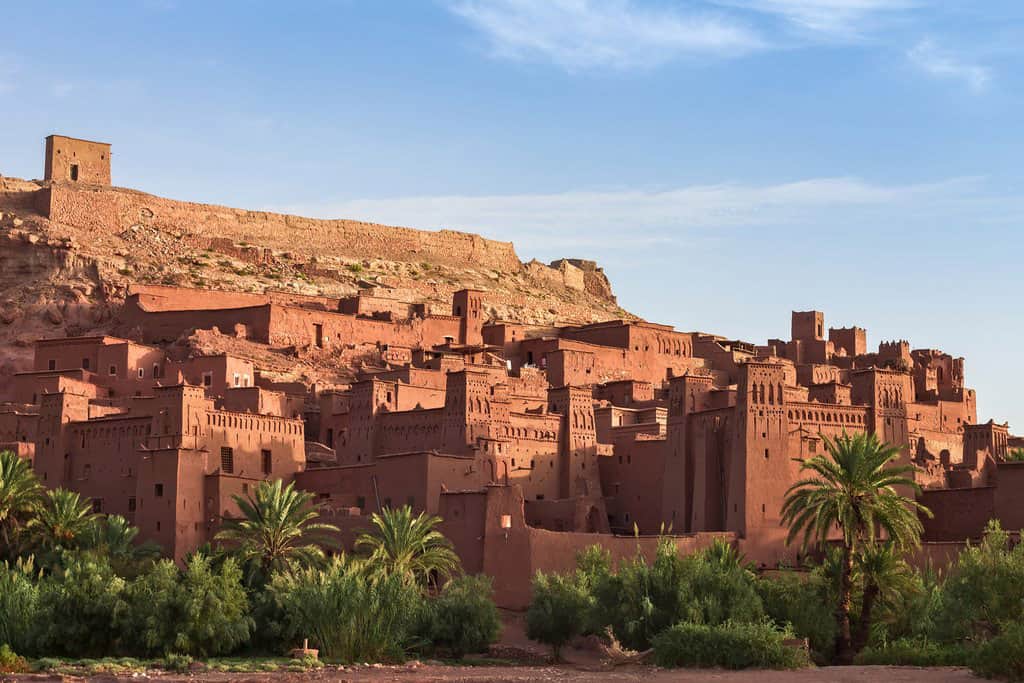3 Days Sahara Desert Tour From Fes to Marrakech
From Fes
3 Days
Overview
Give me More-occo, you say? Travel to Morocco and visit the best of the country’s sights on this 3-day all-encompassing adventure from Fes to Marrakech. From the Atlas Mountains to the famous Ait Ben Haddou kasbah, the Saharan deserts to the palmeries of Todra Valley, and from the medieval old town of Fes to the spice markets of Marrakech, the most spectacular of Morocco await. Observe the vibrant contrasts between old and new architecture, artwork, and cuisine. Learn about fallen cities and cross paths with nomadic tribes. The majesty of Morocco is a feast for the senses and is waiting to be explored.
Details & Itinerary
Day 1: Fez – Ifrane – Midelt – Ziz Gorges – Erfoud – Rissani – Merzouga
We will pick you up from your riad/hotel then drive south to Ifrane and Azrou through the Middle Atlas mountains. On the way we will stop at the cedar forests to see the Barbarian Apes in their natural habitat. Traveling through the Tizi Ntalghamt pass to Midelt and along the magnificent Ziz Gorges carved through volcanic rock, you’ll see views of the Middle-Atlas plateau and the scenery changing to reveal hints of the desert as you approach the city of Errachidia. After lunch, we’ll continue our journey through the Ziz Valley to Erfoud, Rissani, and Merzouga. After a glass of mint tea, we’ll leave our luggage in a safe room then take a camel ride to a Berber camp in the middle of the Erg Chebbi Sad Dunes which are the highest sand dunes in North Africa. The camel trek takes about 1hr 30 min from to the camp where we will set up Berber tents for our night in the desert. The tents are well-equipped with mattresses, blankets, and cushions. After dinner, we will gather around the fire and enjoy the sound of traditional Berber drums under the stars.
Day 2: Merzouga – Todra Gorge – Tinghir- Dades Valley
We will wake up early to enjoy a magnificent sunrise on the dunes then take a camel ride back to the hotel. After freshening up and breakfast we’ll leave for Tinghir and the Todra Gorges and finally arrive in the Dades Valley where we will have dinner and spend the night.
Day 3: Dades Valley – Skoura – Ouarzazate- Ait Ben Haddou Kasbah – High Atlas mountain – Marrakech
After breakfast, we’ll drive through the Dades Valley towards Kalaat Mgouna and Ouarzazate. The route through the Dades Valley, the way of the thousand Kasbahs, provides numerous photo opportunities. We’ll visit the Roses valley and Skoura village, then continue to Ouarzazat, “the Hollywood of Africa”. Lunch is at the famous Ait Ben Haddou kasbah, the largest Kasbah in Morocco. After touring this UNESCO World Heritage site, our journey will continue through the majestic Tizi nTichka pass, reaching an altitude of 2260m, over the High Atlas Mountains. We will stop to enjoy the impressive views and visit the argan oil cooperative. We will arrive in Marrakech late afternoo.
Tour Itinerary
Day 1: Fez – Ifrane – Midelt – Ziz Gorges – Erfoud – Rissani – Merzouga
Day 2: Merzouga – Todra Gorge – Tinghir- Dades Valley
Day 3: Dades Valley – Skoura – Ouarzazate- Ait Ben Haddou Kasbah – High Atlas mountain – Marrakech
What’s Included
Planning and quality control by seasoned travel leaders
Knowledgeable Guides (Multi-lingual), special lectures, and insightful meetings
Entrance Fees to Historic Monuments
All Transfers-even individual airport transfers, when required.
Luggage Handling-at all hotels, airport, etc.
Air-Conditioned, comfortable, and luxurious vehicles depending on your choice (4*4, Mini-bus…).
Nights at the top range hotels, Riads, Kasbahs, and Bivouacs.
Elegant Meals (Breakfast daily, and usually either Dinner).
All details are handled by reliable, experienced Tour Leaders.
Outstanding value and convenience.
No hidden add-ons or markup.
What’s Excluded
Lunchs
Tips
Travel insurance charges
Travel Advices
_
_
Best time to visit Morocco
The climate in Morocco varies wildly according to the season and area of travel. In the lowlands, the cooler months from October to April are popular among visitors. This time of year is pleasantly warm to hot (around 30°C) during the day and cool to cold (around 15°C) at night. Winter in the higher regions often brings snow and can therefore get seriously cold, particularly at night. Tourists flock to the coastline from June to September for fun in the sun, with warm mostly rain-free days. Further inland it can get hot and rain is rare, which makes the best times to travel March to June and September to December.
Morocco Culture & Customs
Morocco's culture has developed over centuries of influence from far and wide. Contemporary Morocco is a fascinating mix of Berber, Mediterranean, Andalucian, and African traditions, which are present in the cuisine, clothing, music, language, customs, and lifestyle. As an Islamic country, most Moroccans are Muslim; however, there are small populations of people who practice Judaism and Christianity. Classic examples of Islamic architecture can be observed all throughout the country and tenets of the Islamic religion are carried out in the customs and lives of the people. The 'Call to Prayer' can be heard five times a day, women are expected to dress modestly and alcohol isn't drunk by most of the population.
Most of Moroccan society can be considered traditional, with respect for elders, connection to family, and giving alms to the poor hallmarks of everyday life for many Moroccans. Hospitality is another important element of society, with warmly welcoming people into your home a time-honored tradition and social responsibility that dates back centuries.
Vegetarian and Vegan Options in Morocco ?
Much of Morocco's cuisine revolves around meat, but vegetables are an important staple and a crucial ingredient in many dishes of the Maghreb. Your diet can consist of more than just flatbread and hummus – trust us. Keep an eye out for vegetable-based tagines and couscous, the renowned Zaalouk (a smokey eggplant and tomato salad), vegetable Briouats (triangular-filled pastries), and cinnamon oranges. Vegan options are slightly more limited, as many of the pieces of bread and couscous dishes have butter added to them, but your best bet is to enquire if yours can be made using oil instead. Otherwise, it's easy to dine well on varied vege offerings in Morocco.





